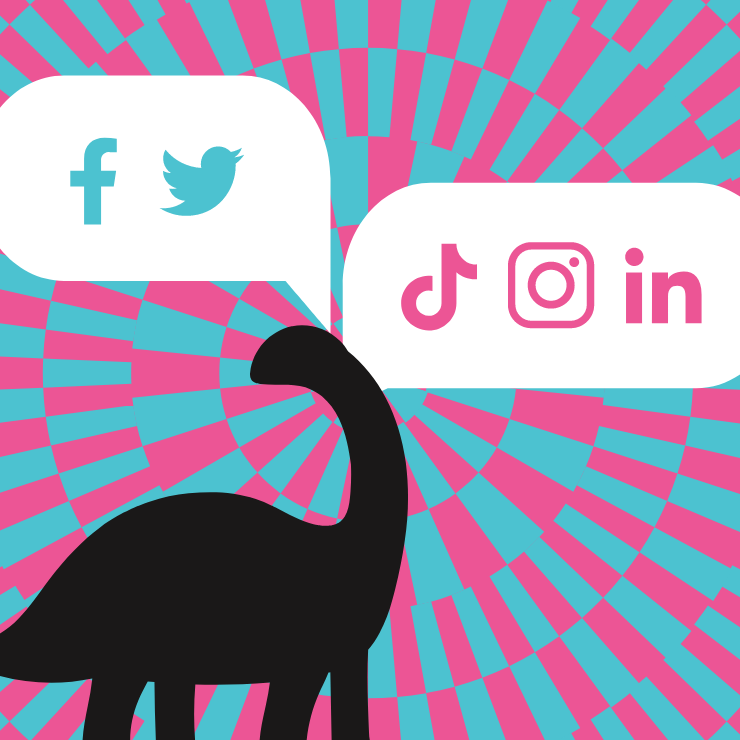Is B2B organic social media dead? No — because it’s evolving faster than ever.

Many people believe the dinosaurs died out, but that’s not exactly true. Billions of their feathered descendants flourish amongst us today.
Similarly, many people believe that organic social media for B2B marketing is dead. They’re wrong. B2B organic social hasn’t died — it’s evolved. It used to be considered simply an inexpensive way to reach lots of people, but today savvy marketers recognize B2B organic as a cost-effective way to share great content that helps grow your community. I’d like to address some of the reasons people believe B2B organic social is extinct, along with the reality proving why it’s still vital in today’s marketing mix.
Myths and realities about the “death” of B2B organic social.
1.
“B2B organic is dead because it’s great for B2C but lousy for B2B. Organic only works for B2C because the audience is so much bigger, and you’re much more likely to hit people when they’re ready to buy.”
However …
B2B organic is vital because businesses are run by people, too. Every purchase decision is an emotional decision, so it’s important to connect with people who research business purchases, care what their peers think, and like to share content that speaks to them. According to a recent Edelman Trust Barometer study, 59% of people will stop buying from a brand if they do not trust them; and 67% of people will stay local and advocate for brands they trust.
2.
“B2B organic is dead because it just doesn’t reach enough people anymore. Since organic only reaches people who follow you, it’s just preaching to the choir and not expanding to more stages of the funnel.”
But actually …
B2B organic is vital because it helps you shape how people talk about and view your brand. It lets you:
- Share content with your followers (including employees) that they can share with their networks.
- Give followers and others a place to talk about topics important to them where you can join the conversation and have an impact on their perception.
- Have a two-way dialogue with your audience that builds relationships and grows your community.
3.
“B2B organic is dead because it’s less effective than paid social. With paid you can target who sees your message and reach a lot more of them. Organic only talks to people who already know you.”
Maybe, but …
B2B organic is vital because organic and paid complement each other. While paid social tends to get all the glory because of almost guaranteed metrics to help hit campaign goals, there’s another effect often overlooked: paid social can elevate your organic social channels’ visibility and increase followers. When paid social leads people to your pages, having active channels can encourage them to engage and learn more about your business.
4.
“B2B organic is dead because you can’t demonstrate ROI. Paid social lets you track lots of metrics over a huge sample size, and organic doesn’t.”
Not true!
B2B organic is vital because community engagement has measurable value. With the right tools, you can absolutely track brand awareness metrics, leads and even sales from organic. Each of those KPIs can be assigned monetary values, so it’s not only possible but essential to track the ROI of organic. And what’s more, that ROI is often as good as or even better than paid.
They key is patience — don’t forget that organic social is a long game. It takes time to build the credibility and customer loyalty referenced in the Edelman study. Looking for quick hits can set you up for disappointment.
Plus, organic gives B2B organizations a cost-efficient way to experiment with new channels, tactics and messages. Today’s B2B marketers know how important it is to always be testing and organic social gives them more license to innovate. After all, testing means sometimes failing, and without failure there can’t be growth. But it’s a lot less expensive to try something that fails in organic than just about any other medium.
Content and cadence grow engagement.
Organic social is so dynamic, you can spark big improvements in a short period of time.
For instance, we recently revamped a client’s organic social strategy to grow their following and drive more audience engagement. By establishing a more regular posting cadence and identifying specific content pillars to focus on based on their audience’s interests, we increased their engagement rate by 14%, and followers by 5%, in just six months.
These increases naturally lead to more relationship-building opportunities, which can turn into sales and loyal customers.
Let’s evolve your B2B organic marketing strategy!
B2B organic social is far from dead. With its ongoing evolution, organic these days offers B2B brands channels and tactics that may not have been on your radar screen even two years ago.


